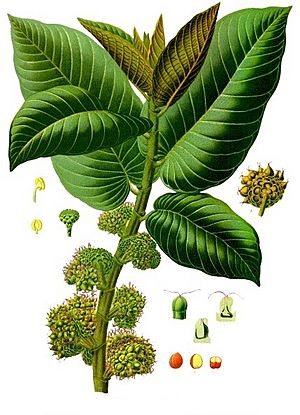Panama rubber tree facts for kids
The Panama rubber tree (scientific name: Castilla elastica) is a fascinating tree. It grows in warm, tropical places like Mexico, Central America, and northern South America. Long ago, before Christopher Columbus arrived, people in Mesoamerica used this tree a lot. It was their main source of a milky liquid called latex. This latex was turned into useful rubber.
Quick facts for kids Panama rubber tree |
|
|---|---|
 |
|
| Conservation status | |
| Scientific classification |
|
| Kingdom: | Plantae |
| Clade: | Tracheophytes |
| Clade: | Angiosperms |
| Clade: | Eudicots |
| Clade: | Rosids |
| Order: | Rosales |
| Family: | Moraceae |
| Genus: | Castilla |
| Species: |
C. elastica
|
| Binomial name | |
| Castilla elastica Cerv.
|
|
| Script error: The function "autoWithCaption" does not exist. | |
| Synonyms | |
|
|
Script error: No such module "Check for conflicting parameters".
Contents
The Amazing Rubber Tree
The Panama rubber tree was super important in ancient times. People in Mesoamerica (a region in Central America and Mexico) used its sap. This sap, called latex, is a milky white liquid. They found a clever way to turn it into bouncy rubber.
How Ancient People Made Rubber
To make rubber, people mixed the tree's latex with juice. This juice came from a plant called the morning glory. Specifically, they used the Ipomoea alba species. It's pretty cool because this morning glory vine often grows right on the Panama rubber tree! This mixture made the latex change into real, usable rubber.
Rubber for Games and More
The rubber made this way had many uses. One of the most famous uses was for making balls. These balls were used in the ancient Mesoamerican ballgame. This game was called ōllamaliztli. It was a very important sport and ritual in their culture.
The word for rubber in the Nahuatl language was ulli or olli. This word also gave names to other things. The ballgame itself got its name from olli. Also, the ancient people known as the Olmecs were called olmeca. This means "rubber people," because they were linked to the origin of the ballgame.
The Nahuatl name for the Castilla elastica tree is olicuáhuitl. In Spanish, people call it palo de hule. Both names mean "rubber tree."
Types of Panama Rubber Tree
There are a couple of different types, or subspecies, of the Panama rubber tree:
- Castilla elastica ssp. costaricana
- Castilla elastica ssp. elastica
Other Names for the Tree
You might hear the Panama rubber tree called by other names. Some common names include Caucho and Castilloa rubber.
See also
 In Spanish: Caucho o hule para niños
In Spanish: Caucho o hule para niños
- Guayule - another plant used for latex by ancient Mesoamericans
- Para rubber tree - the main source of natural rubber used today
 | Tommie Smith |
 | Simone Manuel |
 | Shani Davis |
 | Simone Biles |
 | Alice Coachman |


